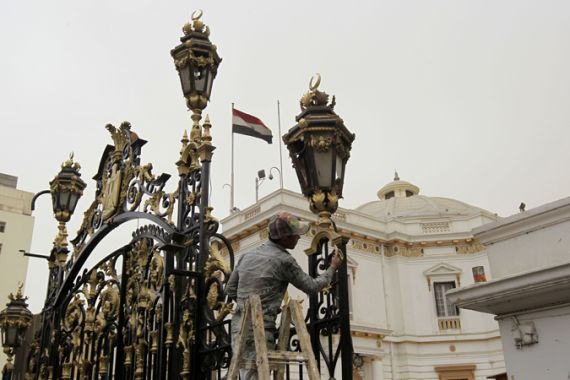Egypt’s new parliament to hold first session
Islamist-dominated lower house will meet on Monday days after completing first election since fall of Hosni Mubarak.

Just days after finishing a historic election that put Islamists in the legislative driving seat, Egypt’s lower house of parliament on Monday will sit for the first time since former president Hosni Mubarak was deposed nearly one year ago.
The Muslim Brotherhood’s Freedom and Justice party, which took roughly 43 per cent of the People’s Assembly, has vowed to guide Egypt through the transition from military to civilian rule while upholding personal liberties.
The Brotherhood has also promised not to ally with the ultra-conservative Nour Party, which largely represents Egypt’s fundamentalist Salafi community and came in second, winning around 21 per cent of available seats.
The rise of the Islamists marks a sea change from the Mubarak era, when parliament was a compliant body dominated by a supermajority of his National Democratic Party (NDP).
|
Al Jazeera interviews Abdullah Alashaal on the Egyptian parliament
|
The Brotherhood was officially banned, and though its members won an unprecedented fifth of parliament in 2005 by running as independents, in practice no party but the NDP could ever affect legislation.
The Supreme Council of the Armed Forces, which took power on February 11, have promised to remain in charge only until a presidential election in June, though many Egyptians suspect the army may seek to cling on to power from behind the scenes even after that.
“It will be a historic session in Egypt’s transition to democracy and civilian rule,” Mohamed Beltagy, a leading member of the Freedom and Justice Party, said on Sunday.
One of the first steps in Monday’s session will be electing the speaker. The FJP has nominated its secretary-general, Saad el-Katatni, and he will probably be approved.
Youth protest
Youth movements, who sparked and led Egyptians in the 18-day revolt against Mubarak, said they would demonstrate outside the assembly to ensure protesters killed in the uprising were not forgotten.
They are barely represented in the People’s Assembly. After the FJP and Nour, whose coalitions combined make up 70 per cent of the lower house, there is the Wafd, an eight-decade-old party with eight per cent, and the Egyptian Bloc, a new liberal coalition led in part by billionaire telecom mogul Naguib Sawiris, which won almost seven per cent.
“We do not contest the popular mandate of parliament, but it better deliver on the rights of martyrs and wounded. We fear political parties may vie for political gain and ignore the youth,” activist Mohamed Fahmy said.
Though liberals and youth harbour suspicions and even fears of the Brotherhood and the Salafis, most agree that the main obstacle to a democracy is the military council, which has failed to reform the loathed security forces and halt military trials of civilians. Military police have also attacked and killed demonstrators on multiple occasions.
The Brotherhood represents the most powerful counter to the military, and though its members have said they are willing to negotiate with the SCAF during the transition, the two sides have clashed over the powers of the new parliament.
“The Egyptian military seems at this point determined to carve out an exception to democratic rule for its area of power and interest,” Human Rights Watch’s executive director Kenneth Roth said on Sunday at the launch of the group’s annual report in Cairo.
Parliamentarians see the new assembly as bringing Egypt a step closer to ending military rule.
“We say that we respect and appreciate the army but the military council must be held accountable for any mistakes … No one is above accountability,” the Brotherhood’s general guide, Mohamed Badie, said last week.
Some analysts have suggested the army will not fully abandon politics unless the Brotherhood and other prominent political parties offer guarantees that it will not face legal retribution over the killing of protesters.
Mubarak, 83, is now on trial for his role in the deaths of 850 people during the uprising. Scores of people have been killed in sporadic eruptions of violence since then, including demonstrations against army rule in November and December.
A Brotherhood source said its members would form a human chain around parliament to stop any protest turning violent.